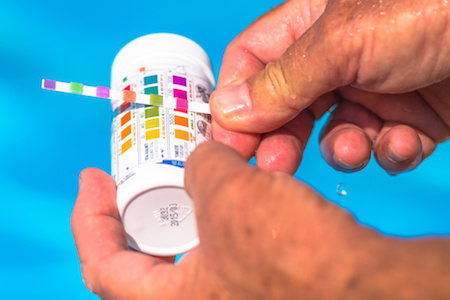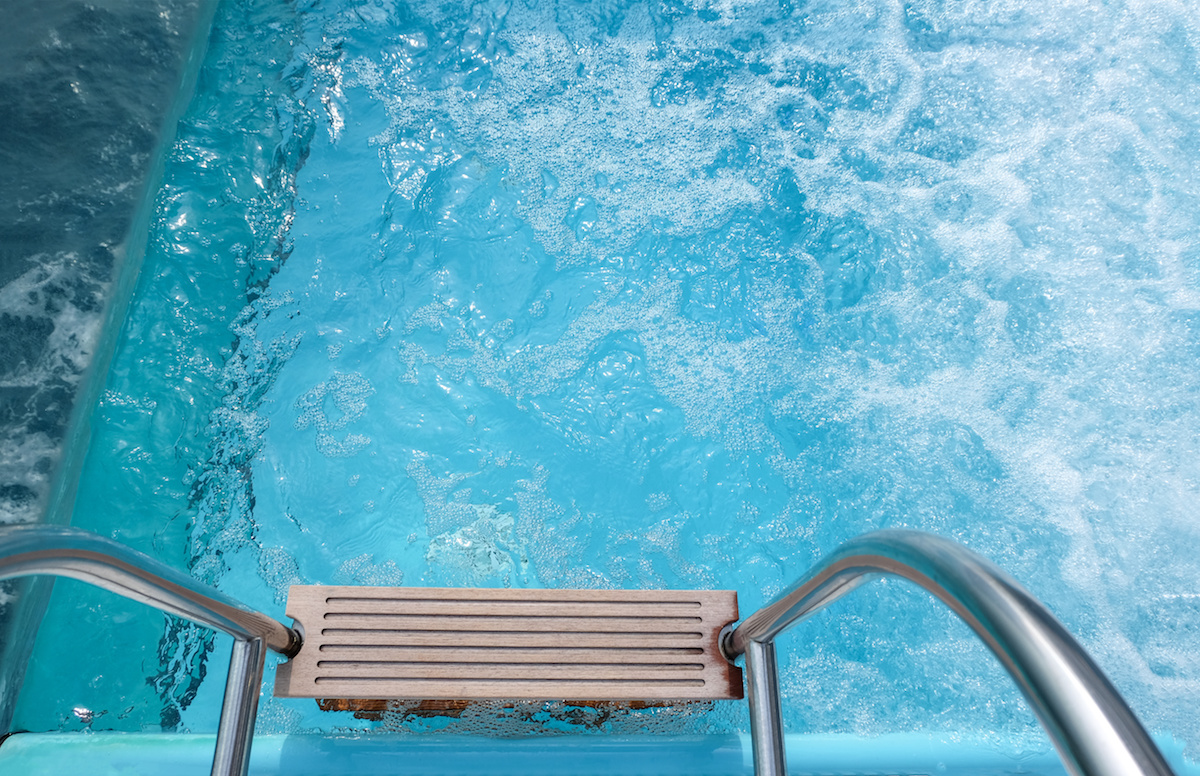Frequently Asked Questions: Pools and Your Health
As the current COVID-19 crisis unfolds in the United States, many Americans are trying to learn how best to keep themselves safe from bacteria and viruses. Governor Doug Ducey issued a stay-at-home order on March 30th until the end of April, which reflects the policies put in place by many other states across the country as well as the CDC-recommended social distancing guidelines. However, many Arizonans are still left to wonder what is safe and what isn’t during this time of crisis. For example, is it safe to swim in a pool during this time?
Are Pools Safe During Coronavirus?
Yes, your backyard pool is safe to swim in during the current COVID-19 pandemic. Large social gatherings are banned for now, but swimming in a pool with the people you live with is both allowed and safe. However, there are a few things pool owners should be aware of during this time.
Coronavirus Cannot Survive in Properly-Maintained Pool Water

Make sure to properly maintain your pool’s chemical levels to ensure a safe swimming experience for everyone.
Pool owners know that their pool’s chemicals are vital in preventing illness for anyone who uses the pool. Many illnesses can be caused by bacteria that thrive in untreated water, which is why it’s critical to pay attention to the chemical levels in your pool. Properly-maintained pool water will not allow the coronavirus to survive, so there is little to no risk of transmitting coronavirus in your backyard pool if you keep up with your pool’s maintenance.
The CDC stated that there is no evidence that COVID-19 can be spread to humans through the use of pools or hot tubs: “Proper operation, maintenance, and disinfection (e.g., with chlorine and bromine) of pools and hot tubs should remove or inactivate the virus that causes COVID-19. Conventional water treatment methods that use filtration and disinfection, such as those in most municipal drinking water systems, should remove or inactivate the virus that causes COVID-19.”
How To Keep Your Pool Safe
While it’s no mystery as to why many pool owners are most concerned about COVID-19 right now, the CDC reminds pool owners about other potentially unforeseen health hazards. The CDC states that while chemicals like chlorine are used to kill germs and stop them from spreading, mishandling pool chemicals can cause injuries. To prevent injuries, the CDC recommends that owners of residential pools or hot tubs read and follow the directions on product labels of any pool chemicals before using them.
“When swimmers don’t shower before getting in pools, hot tubs/spas, or water playgrounds — or pee in the water — free chlorine (the form of chlorine that kills germs) combines with pee, poop, sweat, dirt, and personal care products,” the CDC says. “This means there is less free chlorine to kill germs, and (as a result) unwanted chemical compounds are produced.”
One of the unwanted chemical compounds the CDC is referencing is called chloramine. Chloramines make swimmers’ eyes red and sting and can cause skin irritation, rashes, and respiratory problems.
Tips for Healthy Swimming from the CDC
The following are tips from the CDC when it comes to swimming in public places. These tips, while maybe not quite as useful now, are certainly something to keep in mind following the COVID-19 pandemic to protect yourself and your family.
- Check out the latest inspection score assigned to a public pool or hot tub/spa.You can typically find inspection scores online or on-site.
- Do your own mini-inspection.Use test strips to check disinfectant (chlorine or bromine) level and pH before getting in the water. Most superstores, hardware stores, and pool-supply stores sell test strips.
- Shower before you get in the water. Rinsing off in the shower for just one minute helps get rid of most stuff that might be on the swimmer’s body.
- Check yourself! Keep the pee, poop, sweat, blood, and dirt out of the water.
- Don’t swim or let children swim when sick with diarrhea.
- Don’t swallow the water. Just one mouthful of water with diarrhea germs can make you sick for up to 3 weeks.
Other Frequently Asked Questions about Pools and Health
In addition to the concern about coronavirus, many pool owners may be concerned with other health issues when it comes to their backyard pools.
Can Swimming in a Pool Cause a UTI?
Urinary tract infections (UTIs) are caused when bacteria travel up the urethra and to the bladder. The bacteria can come from mistreated pool water. People who often suffer from urinary tract infections can try to avoid them by showering immediately after swimming and changing out of wet clothes or bathing suits as soon as possible. If swimmers suspect they’ve gotten a UTI after swimming, they should contact a doctor. Most likely, the doctor will prescribe either an antibiotic or an antifungal medication to treat the infection.
Can Swimming in a Pool Cause an Ear Infection?
Ear irritation after swimming in a pool may be what’s known as swimmer’s ear rather than a contagious ear infection. Swimmer’s ear is an outer ear canal infection and does not spread between people. The infection is caused by water that has been in the ear canal too long, allowing bacteria to grow. If someone in your home is prone to swimmer’s ear, make sure to wear swimming earplugs or eardrops designed to help prevent swimmer’s ear. After swimming, make sure to always dry ears well with a towel and tip the head to drain as much water from the ear canal as possible.
How Can Specialty Pools Help You?
If you’re stuck at home and canceling that vacation, now’s the time to plan your custom pool. Contact an experienced pool builder at Specialty Pools today. With decades of experience in the area, no other pool builder in the area can offer the types of backyard oases available from Specialty Pools. Call now!

